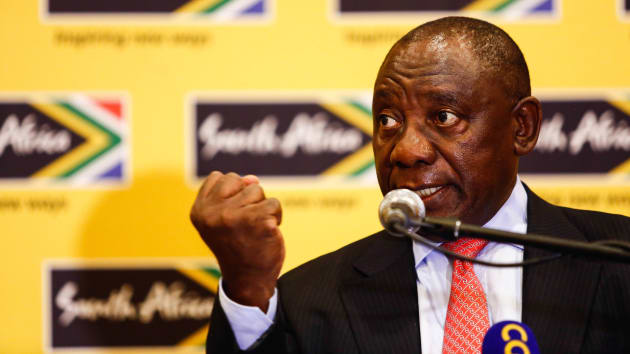
KEY POINTS
- A report issued by the IMF on Monday following a recent research mission predicted that on current policies, the medium-term growth outlook would remain subdued, accompanied by muted inflationary pressures.
- With low per capita GDP (gross domestic product) growth and low job creation, the IMF highlighted, the increase in the working-age population is projected to exacerbate unemployment, poverty and inequality.
- S&P Global Ratings downgraded South Africa’s outlook to “negative” from “stable” on account of the growing debt burden, upwardly revised fiscal deficits and low GDP growth.
Faced with weak economic growth, deteriorating debt situation and major headwinds for state-owned enterprises, both the International Monetary Fund (IMF) and S&P Global Ratings have called on South Africa to enact urgent economic reforms.

A report issued by the IMF on Monday following a recent research mission predicted that on current policies, the medium-term growth outlook would remain subdued, accompanied by muted inflationary pressures.
With low per capita GDP (gross domestic product) growth and low job creation, the IMF highlighted, the increase in the working-age population is projected to exacerbate unemployment, poverty and inequality. Economic growth is set to remain below population growth for the sixth consecutive year in 2020.
South Africa’s “undeniable economic potential” remains mostly untapped, and the economy faces three immediate hurdles, the report by IMF mission lead Ana Lucia Coronel stated.
Persistently weak economic growth is primarily down to stagnant private investment and exports, and declining productivity, owing to the slow process of reform to address the “regulatory constraints, labor market rigidities and inefficient infrastructure” creating a weak business climate.
Deteriorating debt situation
A second obstacle is the country’s rapidly deteriorating fiscal and government debt situation. On Friday, S&P Global Ratings downgraded South Africa’s outlook to “negative” from “stable” on account of the growing debt burden, upwardly revised fiscal deficits and low GDP growth.
“Unless the government takes measures to control the fiscal deficit and we see sustained reform momentum, we view debt as unlikely to stabilize within our three-year forecast period,” the S&P report added.
The ratings agency forecast 0.6% GDP growth this year, down from the 1% expected in May, while unemployment is at a 16-year high of 29%.
IMF staff projections currently show a debt path that exceeds 70% of GDP after 2022 which does not stabilize.
“Without fiscal adjustment to contain this debt build-up, increasing financing needs and sovereign risk would significantly raise borrowing costs, further crowd out growth-enhancing public and private investment, and weaken confidence, with adverse macro-financial spillovers,” Monday’s IMF report concluded.
A third major issue facing the country is the inefficient operations of state-owned enterprises (SOEs), in particular government utility Eskom.
“Inefficiencies in SOEs operating in network industries such as electricity and transport, translate into costly inputs for businesses, and repeatedly require financial support from the fiscus,” Coronel’s report said.
“In sum, the reliance on government spending to boost growth has not delivered the anticipated results as the supply-side nature of the growth constraints has not been addressed.”
Government funding of SOEs has increased debt service costs, which are now the fastest-growing expenditure for Pretoria, leaving its economy with high and rising debt and limited fiscal space to respond to shocks, the IMF reported.
Urgent reform
Finance Minister Tito Mboweni is set to announce his full-year 2020/21 budget in February, and the IMF urged the government to set out measures to address fiscal and SOE challenges and stabilize government debt. It also called for an immediate restoration of fiscal discipline.
“Against this backdrop, fiscal consolidation of about 3 percent of GDP, mainly expenditure-based but supported by tax administration improvements, will be needed over a four-year period assuming that growth-enhancing structural reforms are adopted,” the IMF stated.
Restructuring, liquidating or divesting SOEs based in commercial viability is a top priority, the fund instructed, adding that state utility Eskom must “speedily pursue savings in coal procurement and employee attrition” along with aligning wages with productivity and collecting arrears.
“Failure to implement the needed adjustment in government and SOE spending and efficiency will worsen debt dynamics, erode financial stability, and further raise the country risk premium,” the IMF warned.
“With delays in structural reforms, growth and social conditions will worsen. Implementing the reforms now will benefit from the benign financing conditions in international markets and prevent disruption from an abrupt adjustment in future.”
However, despite winning 57.5% of the vote in May of this year, President Cyril Ramaphosa’s ruling ANC must overcome resistance in order to implement much-needed reforms.
“The growing importance of smaller parties in parliament, such as the Economic Freedom Fighters (EFF), will likely limit the ANC’s wiggle room,” Friday’s S&P analysis cautioned.
“President Ramaphosa is also likely to face further struggles from factions within his party, which have recently blocked key reforms to the labor market and nonfinancial public enterprises (NFPEs).”
Souce: CNBC
CNBC has contacted Eskom for comment.
THE ROTTEN FISH: CAN OF WORMS OPENED OF APC & TINUBU'S GOVERNMENT OVER NIGERIA'S ECONOMIC DOWNTURN
WATCH THE CRITICAL ANALYSIS AND KNOW THE RESPONSIBLE PARTIES TO BLAME FOR NIGERIA'S ECONOMIC CHALLENGES, WHILE CITIZENS ENDURE SEVERE HARDSHIPS.Watch this episode of ISSUES IN THE NEWS on 9News Nigeria featuring Peter Obi's Special Adviser, Dr Katch Ononuju, 9News Nigeria Publisher, Obinna Ejianya and Tinubu Support Group Leader, McHezekiah Eherechi
The economic crisis and hardship in Nigeria are parts of the discussion.
Watch, leave your comments, and share to create more awareness on this issue.
#9NewsNigeria #Nigeria #issuesInTheNews #politics #tinubu THE ROTTEN FISH: CAN OF WORMS OPENED ...
DON'T FORGET TO SUBSCRIBE AND LEAVE YOUR COMMENTS FOR SUBSEQUENT UPDATES
#9newsnigeria #economia #economy #nigeria #government @9newsng
www.9newsng.com
